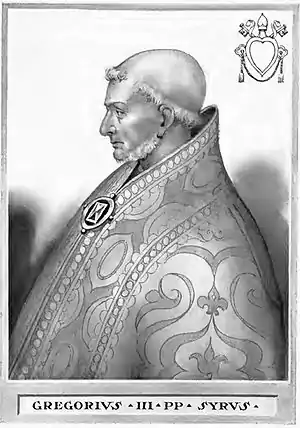731
Year 731 (DCCXXXI) was a common year starting on Monday (link will display the full calendar) of the Julian calendar. The denomination 731 for this year has been used since the early medieval period, when the Anno Domini calendar era became the prevalent method in Europe for naming years.
| Millennium: | 1st millennium |
|---|---|
| Centuries: | |
| Decades: | |
| Years: |
| 731 by topic |
|---|
| Leaders |
|
| Categories |
|
| Gregorian calendar | 731 DCCXXXI |
| Ab urbe condita | 1484 |
| Armenian calendar | 180 ԹՎ ՃՁ |
| Assyrian calendar | 5481 |
| Balinese saka calendar | 652–653 |
| Bengali calendar | 138 |
| Berber calendar | 1681 |
| Buddhist calendar | 1275 |
| Burmese calendar | 93 |
| Byzantine calendar | 6239–6240 |
| Chinese calendar | 庚午年 (Metal Horse) 3427 or 3367 — to — 辛未年 (Metal Goat) 3428 or 3368 |
| Coptic calendar | 447–448 |
| Discordian calendar | 1897 |
| Ethiopian calendar | 723–724 |
| Hebrew calendar | 4491–4492 |
| Hindu calendars | |
| - Vikram Samvat | 787–788 |
| - Shaka Samvat | 652–653 |
| - Kali Yuga | 3831–3832 |
| Holocene calendar | 10731 |
| Iranian calendar | 109–110 |
| Islamic calendar | 112–113 |
| Japanese calendar | Tenpyō 3 (天平3年) |
| Javanese calendar | 624–625 |
| Julian calendar | 731 DCCXXXI |
| Korean calendar | 3064 |
| Minguo calendar | 1181 before ROC 民前1181年 |
| Nanakshahi calendar | −737 |
| Seleucid era | 1042/1043 AG |
| Thai solar calendar | 1273–1274 |
| Tibetan calendar | 阳金马年 (male Iron-Horse) 857 or 476 or −296 — to — 阴金羊年 (female Iron-Goat) 858 or 477 or −295 |

Pope Gregory III (731–741)
Events
Europe
- Umayyad conquest of Gaul: Munuza, Moorish governor of Cerdagne (eastern Pyrenees), rebels against Umayyad authority. He is defeated and executed by Muslim forces under Abdul Rahman Al Ghafiqi at Urgell (Catalonia). Muslim garrisons in Septimania raid the cities Millau and Arles.[1]
- Ragenfrid, ex-mayor of the palace of Neustria, meets Duke Eudes of Aquitaine, to accept his rule and independence from the Frankish Kingdom. Fearing an alliance against him, Charles Martel exiles Ragenfrid's supporter Wandon of Fontenelle, and imprisons bishop Aimar of Auxerre.[2]
- Charles Martel leads two raids across the Loire River into the Berry region. The Franks seize and plunder Bourges (central France), but the city is immediately recaptured by Eudes of Aquitaine.
Britain
- Autumn – King Ceolwulf of Northumbria is deposed by opponents, and forced to enter a monastery. His supporters subsequently restore him to the throne (or 732).
- King Æthelbald of Mercia overruns a large portion of Somerset, and wrests the county from Wessex control (approximate date).
Asia
- Battle of the Defile: An Umayyad relief army (28,000 men) is sent to Samarkand (modern Uzbekistan), which is besieged by the Turgesh.[3] The Muslims are ambushed near the Zarafshan Range, at the Tashtakaracha Pass.[4][5] The battle results in a Pyrrhic victory, with heavy casualties for the Umayyad army, halting Muslim expansion in Central Asia for almost two decades.
Literature
Religion
- February 11 – Pope Gregory II dies at Rome after a 16-year reign, in which he has fought Iconoclasm. He is succeeded by the Syrian-born cleric Gregory III, as the 90th pope of the Catholic Church.[6]
- A Moorish raiding party under Abdul Rahman Al Ghafiqi invades deep into Burgundy, and plunders the monastery of Luxeuil Abbey, located in the Haute-Saône, massacring most of the community.
- November 1 – Synod of Rome: Gregory III summons a council at the shrine of Saint Peter. All western bishops participate, including the Roman nobility. Gregory condemns Iconoclasm as a heresy.[7]
Births
- Abd al-Rahman I, Muslim emir of Córdoba (d. 788)
- Ōtomo no Otomaro, Japanese general and Shōgun (d. 809)
- Telets, ruler (khagan) of the Bulgarian Empire (approximate date)
Deaths
- February 11 – Gregory II, pope of the Catholic Church (b. 669)
- March 13 – Gerald of Mayo, Anglo-Saxon abbot
- August 31 – Ōtomo no Tabito, Japanese poet (b. 665)
- December 22 – Yuan Qianyao, official of the Chinese Tang Dynasty
- date unknown
- Barjik, prince of the Khazar Khaganate
- Berhtwald, archbishop of Canterbury
- Munuza, Moorish governor of Cerdagne
- Ragenfrid, mayor of the palace of Neustria
- Yuwen Rong, chancellor of the Tang Dynasty (or 730)
References
- David Nicolle (2008). Poitiers AD 732, Charles Martel turns the Islamic tide (p. 41). ISBN 978-184603-230-1
- David Nicolle (2008). Poitiers AD 732, Charles Martel turns the Islamic tide (p. 19). ISBN 978-184603-230-1
- Blankinship (1994), pp. 156, 157
- Kennedy (2001), p. 29
- Kennedy (2007), p. 285
- Herbermann, Charles, ed. (1913). . Catholic Encyclopedia. New York: Robert Appleton Company.
- Treadgold, p. 354
This article is issued from Wikipedia. The text is licensed under Creative Commons - Attribution - Sharealike. Additional terms may apply for the media files.